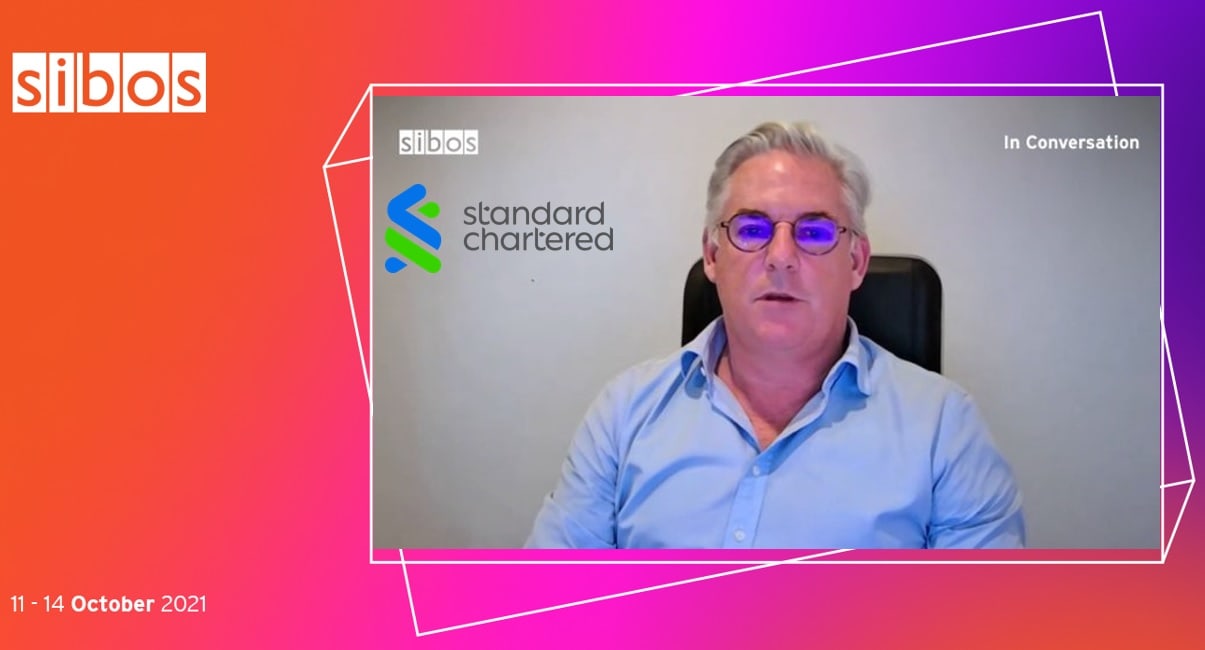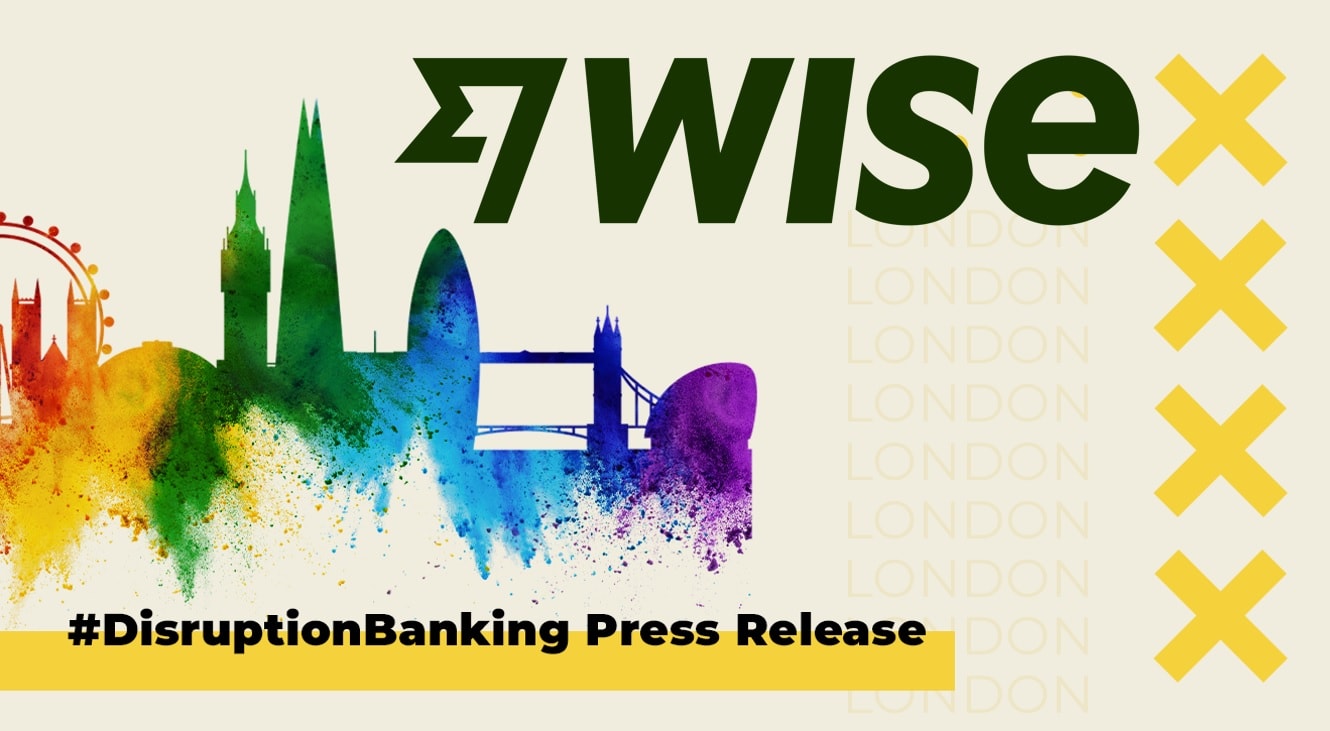Standard Chartered or StanChart is not a bank that is shy about its aspirations when it comes to China. Many of the speakers at this year’s Sibos have talked about China as well. CBDCs, digital transformation and the generous plethora of leaders involved in this years event has been great. Often, the Regulator and the Customer have also been talking points.
There has been something substantially different about topics at Sibos this October. A few years ago when banks had just started looking at hackathons, incubator programmes or accelerators, it was mainly just talk. Looking at the tail end of Covid, then, it’s actually fascinating to hear and learn about some of the use cases for all that digital desire that banks had pre-COVID. Maybe it’s not going to be just talk anymore?
You, of course, waited with anticipation to hear what David Whiteing, Group Chief Operating Officer of Standard Chartered Bank, had to say. Yet, after the first few minutes you started to realise that this is serious. This is really sophisticated tech talk by a leading figure in a global bank. Something really has changed.
David joined Standard Chartered in September 2018 from the Commonwealth Bank of Australia where he was Group CIO. And, the Australian accent was definitely recognizable. And he was as refreshing as his accent let on. Whilst most CEOs share stories about company values and global trends, a COO who talks about tech is not the norm. And David didn’t disappoint, focusing on tech throughout most of the conversation.
“Customers have realised that digital is no longer an option, it’s a necessity.” David commenced the ‘Conversation’ by explaining how it was important to not only listen to customers’ needs. He also felt it was important to listen to their customers’ needs.
As examples of how Standard Chartered is maintaining its ‘Digital First’ aspirations, David pointed at successes such as Mox in Hong Kong and the recent story about a new digital bank in Singapore:
Standard Chartered signs a deal with Singapore’s biggest trade union group to form a digital bank https://t.co/gkB7QztteA
— Bloomberg (@business) September 6, 2021
David shared how “we do a significantly larger amount of experimentation and iteration, often in partnership with customers, versus trying to guess what we think they need. We’ll hopefully be reacting more quickly to the customer needs, innovating more and possibly partnering more as we think about the future.”
The digital bank in Singapore is a fairly recent affair. One that David is rightfully proud to speak about. Does setting up a digital bank really prove you are ‘digital’ though?
Regulators and Customers
David used a different line to many of his peers when he explained how the banking industry must shoulder some of the challenges that working with the regulator brings. He suggests we think of regulation as a failed customer need: “Regulators wouldn’t regulate data privacy, conduct or mis-selling if we [the banking industry] had been diligent and not taken advantage of our customers.
“When you reframe regulation as fulfilling a customer need, it changes the way you think about it. You think about it as an opportunity, rather than as a burden.
“Ultimately, it’s about what’s really right for the customer. I suspect that you’re more likely to be consistently on the right side of regulation, and it’s going to feel a lot less intrusive and a lot less of a burden, then if you don’t think about the customer.”
There was a refreshing feel to the way that David looked at the relationship with the Regulator. Yet, it wasn’t the first time that regulation has been talked about as an opportunity. Because, it’s not just as an opportunity. Open Banking proved beyond doubt the power of regulation and what it can do to an entire industry sector.
The Tech
“As someone who spent their career working in and around technology, I always come back to: ‘What’s the customer need that we’re trying to service?’ And, every time we deploy technology, it should make the customers lives easier, simpler, more intuitive,” David shared.
And then something happened. The conversation changed. It all became partnerships, speed, platforms, and more:
“In a number of these platforms [that Standard Chartered offer customers], it’s about us being able to offer new services to clients, where they’ve got complicated needs. In the past we might not have been able to provide all those capabilities or deliver all those requirements. We would have taken the activity to a certain point and then everything would have been on the customer.
“By deploying platforms that are already connected to the technology, we create opportunities for other partners to come in and provide the value added services for the component that we might not be skilled at or don’t have the risk appetite for. And, that combination of a partner, with our capabilities and our platforms, means that the customer doesn’t have to go and solve it themselves.
“These are the types of things that we look at. Whether it be blockchain or some other new emerging protocol, it is a by-product of the obsession to meet the customer need.”
The Olea platform will aim to give investors access to investment options for returns aligning with their risk profiles.@sebsinclair1989 reports.https://t.co/t5LKPmPrOi
— CoinDesk (@CoinDesk) August 30, 2021
“Olea is a joint venture with another one of our partners, Linklogis, who is a leading supply chain finance technology provider who are listed on the Hong Kong Stock Exchange. Through Olea we’ve fully digitised the trade finance origination distribution platform that brings together institutional investors seeking alternative asset classes, with businesses that are acquiring finance. So, it’s a place where people with differing needs and risk appetites can come together and transact.”
Tencent-backed fintech company Linklogis seeks $1.1 billion in Hong Kong IPO https://t.co/eynpahrDSR
— Bloomberg (@business) March 26, 2021
Linklogis has a strong market position in supply chain finance technology in China. David points to how, with the joint venture, Olea provides transparency, especially around the question of ownership within the supply chain.
China
As the tweet below suggests, much of the vision for Olea’s success depends on Standard Chartered’s plans to centre their strategy on China.
We’ve signed a memorandum of understanding with Linklogis, one of China’s largest B2B-focused #blockchain enabled supply chain financing platform, to explore the co-creation of an enhanced supply chain financing proposition for our clients. Find out more: https://t.co/2ZcBtK1TL9 pic.twitter.com/J4kiY5n4w0
— Standard Chartered (@StanChart) February 12, 2019
“China is a big part of our business, and, in particular, the flow from China to the rest of the world. And, that is a key aspect of that [strategy]. We’re always going to be involved in that space,” David imparted. And, Standard Chartered are not alone in this.
Speaking about China resonated with David, who continued by sharing how he sees Chinese businesses as “incredibly technologically aware. There’s a vibrant technology industry in China, and they lead the way in a number of areas, and they are ubiquitous in their adoption of technology. Whether that’s AI, blockchain, facial recognition, etc..”
He shared how if you have to do business in that space, if you wanted to be a trusted partner, a partner of preference, then you need a “technology-centric strategy around your business”.
Looking to the Future
David hinted at the use of natural language processing in the analysis of information related to ESG performance. But he didn’t have a definitive answer. However, he could say that there were experiments and a lot of work to be done in the space.
“Customers are much more digitally literate, and their expectations are much more visible and concrete. It’s important for us to respond to that changing dynamic.” David explains, whilst referring to the question of data privacy and data usage.
David closed by saying how important it was to remain at a growth mindset, and adopt the highest standards.
The digital capabilities in place at Standard Chartered today are impressive. With the support of initiatives like SC Ventures, Standard Chartered seems to be in the right place at the right time. Just where their customers need them.
Author: Andy Samu
#Olea #Linklogis #StandardChartered #StanChart #HongKong #China #GrowthMindset #Mox















